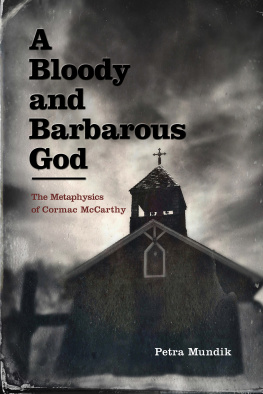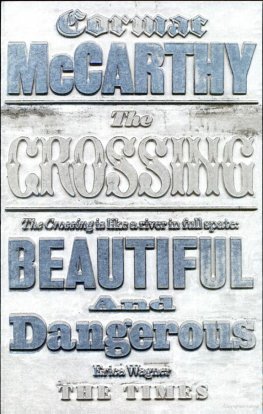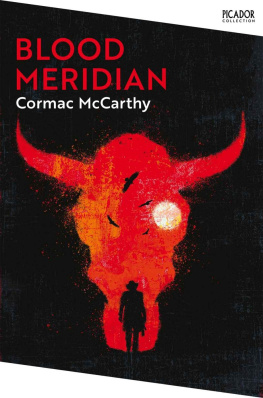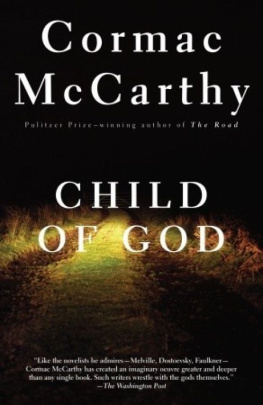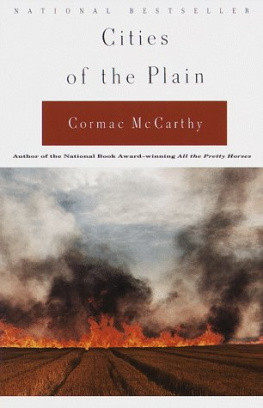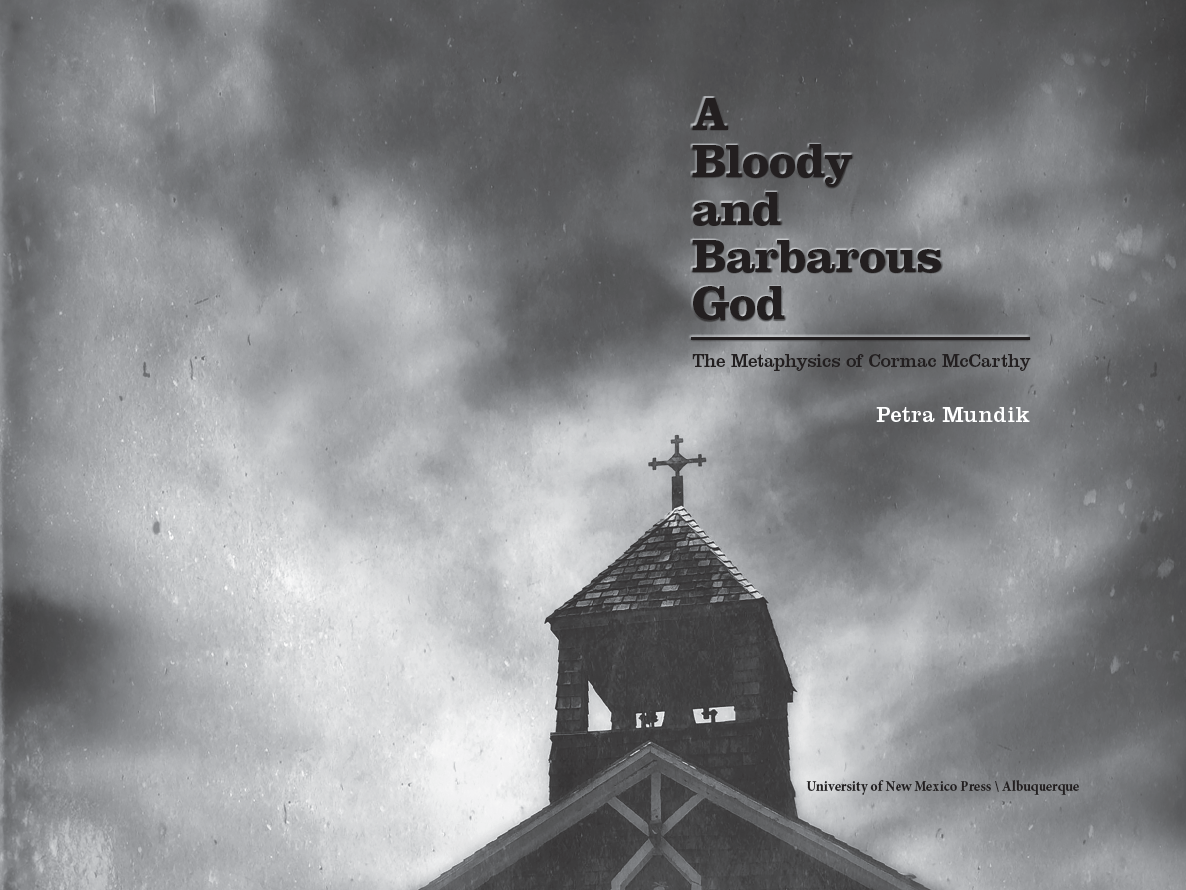Contents
Page List
Guide

A Bloody and Barbarous God
2016 by the University of New Mexico Press
All rights reserved. Published 2016
Printed in the United States of America
First paperback edition, 2021
ISBN 978-0-8263-6334-3
Library of Congress Cataloging-in-Publication Data
Mundik, Petra, 1984
A bloody and barbarous god : the metaphysics of Cormac McCarthy / Petra Mundik.
pages cm
Includes bibliographical references and index.
ISBN 978-0-8263-5670-3 (cloth : alk. paper) ISBN 978-0-8263-5671-0 (electronic)
1. McCarthy, Cormac, 1933 Criticism and interpretation. 2. Metaphysics in literature. 3. Good and evil in literature. 4. Apocalypse in literature. 5. Gnosticism in literature. 6. Philosophy in literature. 7. Mysticism in literature. 8. Spirituality in literature. I. Title. II. Title: Metaphysics of Cormac McCarthy.
PS3563.C337Z775 2016
813.54dc23
2015025658
Cover photograph: 1853 San Acacio Mission Church San Luis Valley courtesy of Wick Beavers
Book design: Catherine Leonardo
Composed in Minion Pro
Display is Clarendon LT Std
Contents
Introduction
A Direct Apprehension of Reality
Cormac McCarthy and the Perennial Philosophy
Despite differing interpretations of McCarthys fiction, most critics will agree that his writing demonstrates mystical strains. Though in his initial interpretation of McCarthys early novels Vereen M. Bell classifies the novelist as a nihilist, four years later he has modified his views, conceding that, despite some nihilistic tendencies, there can be no doubt that McCarthy is a genuineif somehow secularmystic (Between the Wish 926). Edwin Arnold, however, had no doubts from the start about McCarthys esoteric spirituality, arguing that he is a mystic in the way his favorite writer Melville is a mystic, acknowledging and in fact honoring the majesty of the astounding and awful as well as of the simple and beautiful (Mosaic 23). I believe that the presence of the astounding and awful in these novels forms much of the basis of the polarization in McCarthy criticism, precisely because it can be read as a nihilistic portrayal of the darker aspects of human existence or as a spiritual apprehension of the nature of evil.
In Meeting McCarthy, Gary Wallace cites McCarthys views on the subject of spirituality, recalling a conversation in which the reclusive novelist discussed his own spiritual experiences: McCarthy commented that some cultures used drugs to enhance the spiritual experience, and that he had tried LSD before the drug was made illegal. He said that it had helped to open his eyes to these kinds of experiences. Wallace adds that McCarthy said that he felt sorry for me because I was unable to grasp this concept of spiritual experience. He said that people all over the world, in every religion, were familiar with this experience. He asked if Id ever read William Jamess The Varieties of Religious Experience. I had not. His attitude seemed to indicate that in this book were the answers to many of the questions posed during our evening discussion. When Wallace admits to being non-plussed by these words, McCarthy tells him that he is simply talking about Truth, which is what writers must accomplish in their writing. When Wallace fails to understand what Truth is, McCarthy tells him that truth is simply Truth and that the mystical experience is a direct apprehension of reality (138). In the context of the conversation with Wallace, McCarthy seems to be referring to reality in the traditional, Platonic sense of the word, where the ultimate Reality is held to be the Good, or the Absolute. Huston Smith writes, Atop beings hierarchy is the Form of the Good, the most real of the various grades of reality, the Good Itself. Radically different from our everyday world, it can be described only through poetic images (Forgotten Truth 5). I believe that McCarthys novels are, to some extent, akin to these poetic images, which strive toward a Platonic Reality. Such a reading seems to be supported by McCarthys assertion that Truth is what writers must accomplish in their writing. Though McCarthy never directly attempts to describe the Good, he does adumbrate its presence in symbolic images of the fire and other such themes that will be discussed throughout this book, where I contend that his views of the mystical experience offering a glimpse of an ultimate Truth or spiritual Reality are in complete agreement with the major tenets of the Perennial Philosophy. Aldous Huxley neatly defines this term as follows: Philosophia Perennisthe phrase was coined by Leibniz; but the thingthe metaphysic that recognizes a divine Reality substantial to the world of things and lives and minds; the psychology that finds in the soul something similar to, or even identical with, divine Reality; the ethic that places mans final end in the knowledge of the immanent and transcendent Ground of all beingthe thing is immemorial and universal. According to Huxley, the Perennial Philosophy is the Highest Common Factor in all traditional religions and its subject matter is the nature of eternal, spiritual Reality (vii). McCarthy similarly believes that the spiritual experience, or a direct revelation of Truth, is something with which people all over the world, in every religion are familiar (Wallace 138). This does not imply that every religious person is familiar with such an experience but rather that this experience is potentially accessible through every religion.
McCarthys writing reveals a preoccupation not only with experiences of divine Reality but also with the question of evil. William Spencer argues that this is not only a pervasive theme in McCarthys novels but perhaps the issue of human existence that he is most interested in confronting in his fiction (69). This preoccupation with evil, most often explored through depictions of violence, has given rise to many of the nihilistic readings of McCarthys novels. Nevertheless, when such vivid descriptions of violence are combined with his interest in spiritual revelations and his portrayal of the created world as hostile to humanity, it becomes apparent that his world view also has much in common with Gnosticism, which is similarly characterized by a negative evaluation of the created world and a reliance on direct spiritual insight.
Before proceeding further, let me briefly outline the main tenets of the Gnostic belief system. Gnosticism emerged alongside Christianity between the first and third centuries CE, not so much as a heresy, but as a syncretic blending of many influences, including Christian, Hellenic, Babylonian, Egyptian, Iranian, Jewish, and even the Eastern traditions of Buddhism and Hinduism. According to Jonas,
The radical nature of the dualism determines that of the doctrine of salvation. As alien as the transcendent God is to this world is the pneumatic self in the midst of it. The goal of gnostic striving is the release of the inner man from the bonds of the world and his return to his native realm of light. The necessary condition for this is that he knows about the transmundane God and about himself, that is, about his divine origin as well as his present situation, and accordingly also about the nature of the world which determines his situation. (44)
Knowledge of the true state of the cosmos and of the nature of the alien God is referred to as gnosis and, as Elaine Pagels explains in

